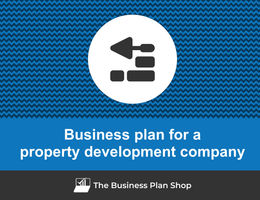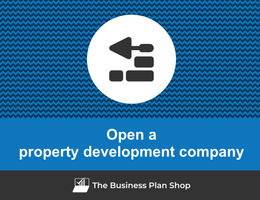How to create a financial forecast for a property development company?
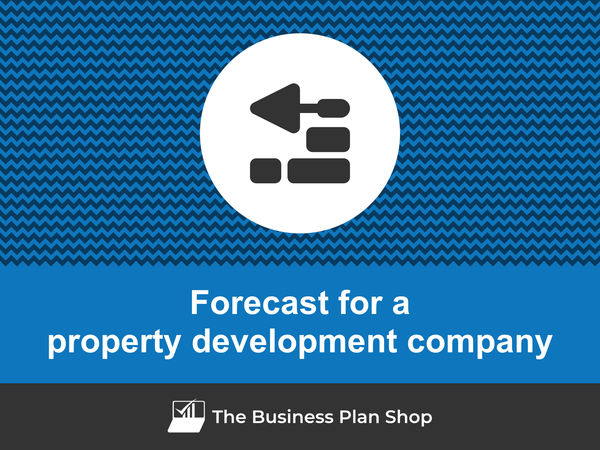
Creating a financial forecast for your property development company, and ensuring it stays up to date, is the only way to maintain visibility on future cash flows.
This might sound complex, but with the right guidance and tools, creating an accurate financial forecast for your property development company is not that hard.
In this guide, we'll cover everything from the main goal of a financial projection, the data you need as input, to the tables that compose it, and the tools that can help you build a forecast efficiently.
Without further ado, let us begin!
Why create and maintain a financial forecast for a property development company?
In order to prosper, your business needs to have visibility on what lies ahead and the right financial resources to grow. This is where having a financial forecast for your property development company becomes handy.
Creating a property development company financial forecast forces you to take stock of where your business stands and where you want it to go.
Once you have clarity on the destination, you will need to draw up a plan to get there and assess what it means in terms of future profitability and cash flows for your property development company.
Having this clear plan in place will give you the confidence needed to move forward with your business’s development.
Having an up-to-date financial forecast for a property development company is also useful if your trading environment worsens, as the forecast enables you to adjust to your new market conditions and anticipate any potential cash shortfall.
Finally, your property development company's financial projections will also help you secure financing, as banks and investors alike will want to see accurate projections before agreeing to finance your business.
Need a convincing business plan?
The Business Plan Shop makes it easy to create a financial forecast to assess the potential profitability of your projects, and write a business plan that’ll wow investors.

What information is used as input to build a property development company financial forecast?
A property development company's financial forecast needs to be built on the right foundation: your assumptions.
The data required to create your assumptions will depend on whether you are a new or existing property development company.
If you are creating (or updating) the forecast of an existing property development company, then your main inputs will be historical accounting data and operating metrics, and your team’s view on what to expect for the next three to five years.
If you are building financial projections for a new property development company startup, you will need to rely on market research to form your go-to-market strategy and derive your sales forecast.
For a new venture, you will also need an itemised list of resources needed for the property development company to operate, along with a list of equipment required to launch the venture (more on that below).
Now that you understand what is needed, let’s have a look at what elements will make up your property development company's financial forecast.
The sales forecast for a property development company
The sales forecast, also called topline projection, is normally where you will start when building your property development company financial forecast.
Creating a coherent sales projection boils down to estimating two key drivers:
- The average price
- The number of monthly transactions
To do this, you will need to rely on historical data (for an existing business), market research data (for both new and existing property development companies), and consider the elements below:
- Location: The location of your properties can greatly influence the average price and number of monthly transactions. Properties in prime locations with high demand will typically sell for higher prices and have a higher turnover rate compared to properties in less desirable areas.
- Economic conditions: Economic factors such as interest rates, inflation rates, and employment rates can affect the purchasing power of potential buyers. If the economy is strong, buyers may be more willing to invest in real estate, leading to an increase in both average price and number of transactions.
- Competition: The level of competition in the property market can impact your sales forecast. If there are many similar properties on the market, buyers may have more bargaining power, leading to lower average prices and longer transaction times. On the other hand, limited competition can drive up prices and speed up transactions.
- Demographics: The demographic characteristics of your target market can also play a role in your sales forecast. For example, if you are targeting a younger demographic, they may be more likely to prioritize location and amenities over price, leading to higher average prices and faster transactions.
- Government policies and regulations: Changes in government policies and regulations can have a significant impact on the property market. For instance, changes in tax laws or zoning regulations can affect the demand for certain types of properties, which can influence your average price and number of monthly transactions.
After the sales forecast comes the operating expenses budget, which we will now look into in more detail.
Need a convincing business plan?
The Business Plan Shop makes it easy to create a financial forecast to assess the potential profitability of your projects, and write a business plan that’ll wow investors.

The operating expenses for a property development company
Once you know what level of sales you can expect, you can start budgeting the expenses required to operate your property development company on a daily basis.
Expenses normally vary based on how much revenue you anticipate (which is why, from experience, it is always better to start your forecast with the topline projection), and where your business is based.
Operating expenses for a property development company will include some of the following items:
- Staff Costs: This includes salaries, wages, benefits, and training costs for all employees, including project managers, construction workers, and administrative staff.
- Accountancy Fees: You will need to hire an accountant or accounting firm to handle financial and tax-related tasks for your property development company.
- Insurance Costs: As a property development company, you will need to have various types of insurance, such as liability insurance, property insurance, and workers' compensation insurance.
- Software Licences: To manage your projects efficiently, you will need to invest in software licenses for project management, accounting, and design programs.
- Banking Fees: You will incur fees for bank accounts, credit card processing, and other financial transactions related to your property development company.
- Legal Fees: You may need to hire a lawyer for legal advice and assistance with contracts, permits, and other legal matters related to your property development projects.
- Marketing and Advertising Costs: To attract potential buyers or investors, you will need to allocate funds for marketing and advertising efforts, such as creating a website, hosting open houses, or running ads.
- Travel Expenses: As a property development company, you may need to travel to different locations to scout potential properties, meet with clients or attend industry events.
- Office Rent and Utilities: You will need to budget for office space rent, utilities, and other related expenses, such as internet and phone services.
- Consultant Fees: Depending on the scale of your projects, you may need to hire consultants, such as architects, engineers, or interior designers, for their expertise and services.
- Permit and License Fees: Before starting any development projects, you will need to obtain permits and licenses from local authorities, which may require fees.
- Maintenance and Repair Costs: As a property development company, you will need to maintain and repair your existing properties, which may include costs for repairs, renovations, and upgrades.
- Property Management Fees: If you plan to rent out or sell your properties, you may need to hire a property management company to handle tasks such as advertising, tenant screening, and rent collection.
- Taxes: You will need to pay various taxes, such as income tax, property tax, and sales tax, on your property development company's earnings.
- Utilities at Development Sites: During the construction phase, you will need to pay for utilities, such as water and electricity, at your development sites.
This list will need to be tailored to the specificities of your property development company, but should offer a good starting point for your budget.
What investments are needed to start or grow a property development company?
Once you have an idea of how much sales you could achieve and what it will cost to run your property development company, it is time to look into the equipment required to launch or expand the activity.
For a property development company, capital expenditures and initial working capital items could include:
- Land Acquisition: The purchase of land for development purposes is a major capital expenditure for a property development company. This includes the cost of the land itself, as well as any associated fees such as legal and surveying fees.
- Construction Costs: This includes all costs associated with the construction of the property, such as materials, labor, and equipment. It also includes any contractors or subcontractors hired for specific tasks.
- Infrastructure Development: In addition to the construction of the property, a property development company may also need to invest in infrastructure development, such as roads, utilities, and landscaping. These are essential for the functioning and attractiveness of the property.
- Building Improvements: Once the property is built, there may be ongoing expenses for improvements or renovations to maintain or enhance the value of the property. This could include upgrades to the building's systems, such as HVAC or electrical, as well as cosmetic improvements like painting or remodeling.
- Furniture and Fixtures: Furniture and fixtures needed for the property, such as appliances, furnishings, and equipment, are also considered capital expenditures. These items are essential for the functioning and livability of the property and can be a significant investment for a property development company.
Again, this list will need to be adjusted according to the specificities of your property development company.
Need a convincing business plan?
The Business Plan Shop makes it easy to create a financial forecast to assess the potential profitability of your projects, and write a business plan that’ll wow investors.

The financing plan of your property development company
The next step in the creation of your financial forecast for your property development company is to think about how you might finance your business.
You will have to assess how much capital will come from shareholders (equity) and how much can be secured through banks.
Bank loans will have to be modelled so that you can separate the interest expenses from the repayments of principal, and include all this data in your forecast.
Issuing share capital and obtaining a bank loan are two of the most common ways that entrepreneurs finance their businesses.
What tables compose the financial plan for a property development company?
Now let's have a look at the main output tables of your property development company's financial forecast.
The forecasted profit & loss statement
The profit & loss forecast gives you a clear picture of your business’ expected growth over the first three to five years, and whether it’s likely to be profitable or not.

A healthy property development company's P&L statement should show:
- Sales growing at (minimum) or above (better) inflation
- Stable (minimum) or expanding (better) profit margins
- A healthy level of net profitability
This will of course depend on the stage of your business: numbers for an established property development company will look different than for a startup.
The projected balance sheet
Your property development company's projected balance sheet provides a snapshot of your business’s financial position at year-end.
It is composed of three types of elements: assets, liabilities and equity:
- Assets: represent what the business possesses including cash, equipment, and accounts receivable (money owed by clients).
- Liabilities: represent funds advanced to the business by lenders and other creditors. They include accounts payable (money owed to suppliers), taxes payable and loans from banks and financial institutions.
- Equity: is the combination of what has been invested by the business owners and the cumulative profits and losses generated by the business to date (which are called retained earnings). Equity is a proxy for the value of the owner's stake in the business.
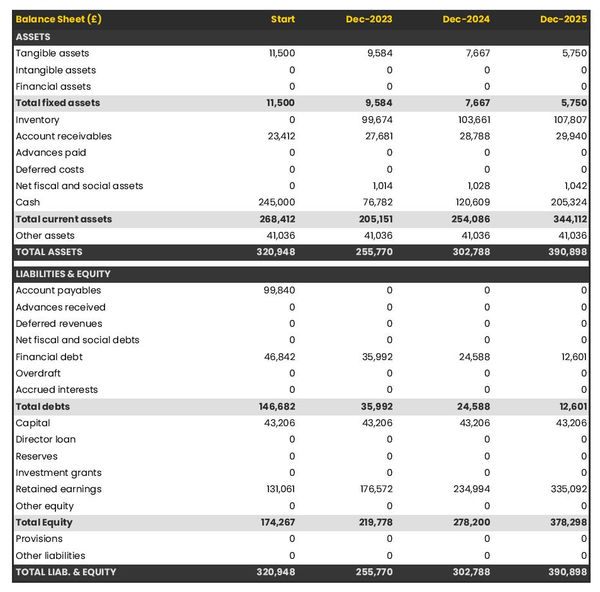
The cash flow forecast
Your property development company's cash flow forecast shows how much cash your business is expected to consume or generate in the years to come.
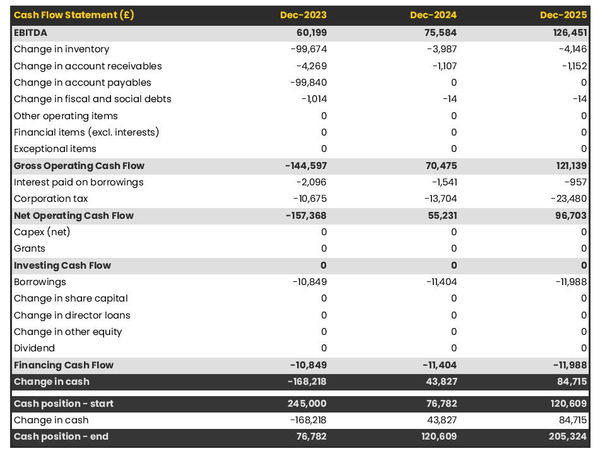
It is best practice to organise the cash flow forecast by nature to better explain where cash is used or generated by the property development company:
- Operating cash flow: shows how much cash is generated by the operating activities
- Investing cash flow: shows how much will be invested in capital expenditure to maintain or expand the business
- Financing cash flow: shows if the business is raising new capital or repaying financiers (debt repayment, dividends)
Keeping an eye on (and regularly updating) your property development company's cash flow forecast is key to ensuring that your business has sufficient liquidity to operate normally and to detect financing requirements as early as possible.
If you are trying to raise capital, you will normally be asked to provide a monthly cash flow forecast in your property development company's financial plan - so that banks or investors can assess seasonal variation and ensure your business is appropriately capitalised.
Need a convincing business plan?
The Business Plan Shop makes it easy to create a financial forecast to assess the potential profitability of your projects, and write a business plan that’ll wow investors.

Which tool should you use to create your property development company's financial projections?
Building a property development company financial forecast is not difficult provided that you use the right tool for the job. Let’s see what options are available below.
Using online financial forecasting software to build your property development company's projections
The modern and easiest way is to use professional online financial forecasting software such as the one we offer at The Business Plan Shop.
There are several advantages to using specialised software:
- You can easily create your financial forecast by letting the software take care of the financial calculations for you without errors
- You have access to complete financial forecast templates
- You get a complete financial forecast ready to be sent to your bank or investors
- You can easily track your actual financial performance against your financial forecast, and recalibrate your forecast as the year goes by
- You can create scenarios to stress test your forecast's main assumptions
- You can easily update your forecast as time goes by to maintain visibility on future cash flows
- You have a friendly support team on standby to assist you when you are stuck
- It’s cost-efficient and much cheaper than using an accountant or consultant (see below)
If you are interested in this type of solution, you can try our forecasting software for free by signing up here.
Hiring a financial consultant or chartered accountant
Hiring a consultant or chartered accountant is also an efficient way to get a professional property development company financial projection.
As you can imagine, this solution is much more expensive than using software. From experience, the creation of a simple financial forecast over three years (including a balance sheet, income statement, and cash flow statement) is likely to start around £700 or $1,000 excluding taxes.
The indicative estimate above, is for a small business, and a forecast done as a one-off. Using a financial consultant or accountant to track your actuals vs. forecast and to keep your financial forecast up to date on a monthly or quarterly basis will naturally cost a lot more.
If you choose this solution, make sure your service provider has first-hand experience in your industry, so that they may challenge your assumptions and offer insights (as opposed to just taking your figures at face value to create the forecast’s financial statements).
Why not use a spreadsheet such as Excel or Google Sheets to build your property development company's financial forecast?
You and your financial partners need numbers you can trust. Unless you have studied finance or accounting, creating a trustworthy and error-free property development company financial forecast on a spreadsheet is likely to prove challenging.
Financial modelling is very technical by nature and requires a solid grasp of accounting principles to be done without errors. This means that using spreadsheet software like Excel or Google Sheets to create accurate financial forecasts is out of reach for most business owners.
Creating forecasts in Excel is also inefficient nowadays:
- Software has advanced to the point where forecasting can be done much faster and more accurately than manually on a spreadsheet.
- With artificial intelligence, the software is capable of detecting mistakes and helping decision-making.
Spreadsheets are versatile tools but they are not tailor-made for reporting. Importing your property development company's accounting data in Excel to track actual vs. forecast is incredibly manual and tedious (and so is keeping forecasts up to date). It is much faster to use dedicated financial planning tools like The Business Plan Shop which are built specially for this.
Need a convincing business plan?
The Business Plan Shop makes it easy to create a financial forecast to assess the potential profitability of your projects, and write a business plan that’ll wow investors.

Use our financial projection templates for inspiration
The Business Plan Shop has dozens of financial forecast templates available.
Our examples contain a complete business plan with a financial forecast and a written presentation of the company, the team, the strategy, and the medium-term objectives.
Whether you are just starting out or already have your own property development company, looking at our financial forecast template is a good way to:
- Understand what a complete business plan should look like
- Understand how you should model financial items for your property development company
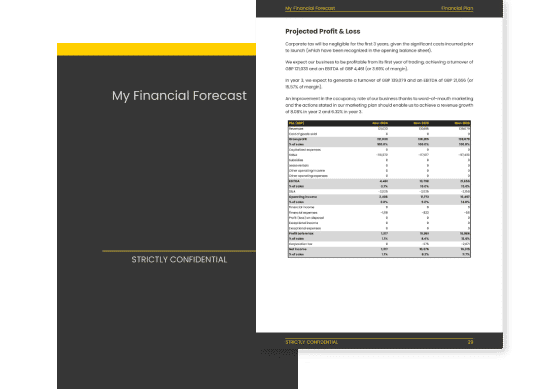
Takeaways
- A financial forecast shows expected growth, profitability, and cash generation metrics for your property development company.
- Tracking actuals vs. forecast and having an up-to-date financial forecast is key to maintaining visibility on your future cash flows.
- Using financial forecasting software is the modern way of creating and maintaining financial projections.
We hope that this guide helped you gain a clearer perspective on the steps needed to create the financial forecast for a property development company. Don't hesitate to contact us if you have any questions!
Need a convincing business plan?
The Business Plan Shop makes it easy to create a financial forecast to assess the potential profitability of your projects, and write a business plan that’ll wow investors.

Also on The Business Plan Shop
- Financial forecast example
- How to write a property development company business plan
- How to project revenues for a business?
- Financial forecast for a business idea
Know someone who runs a property development company? Share our business guide with them!


